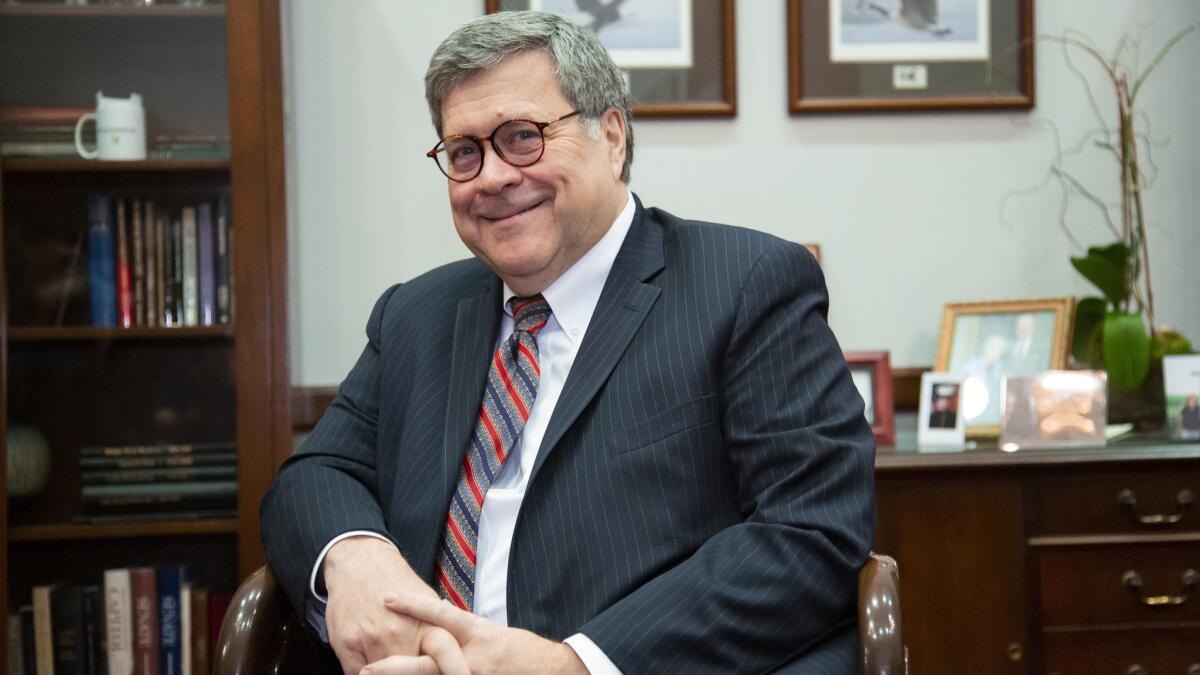Editorial: Will William Barr protect the Mueller investigation? The Senate had better find out

- Share via
On the eve of his confirmation hearings, William Barr, President Trump’s nominee for attorney general, has told the Senate Judiciary Committee that he believes special counsel Robert S. Mueller III should be allowed to complete his investigation and that the results should be made public.
That’s an encouraging signal from the nominee of a president who has repeatedly assailed the Mueller investigation as a partisan “witch hunt.” But senators need to press Barr for specific commitments that Mueller will be allowed to operate without political interference and will be able to share his conclusions of law and fact about all aspects of the investigation — including, for example, the possibility that Trump obstructed justice by firing former FBI Director James B. Comey. (The New York Times reported Friday that, after Comey’s firing, the FBI launched a counterintelligence investigation into whether Trump had been working on behalf of Russia against U.S. interests.)
In prepared testimony released before Tuesday’s hearing, Barr, who was attorney general under President George H.W. Bush, expressed his “utmost respect“ for Mueller and said that he would “provide as much transparency as I can consistent with the law” in sharing the special counsel’s conclusions.
That’s not enough. Senators should press him to commit specifically to publicizing not just the results of Mueller’s investigation but detailed findings, even if Barr disagrees with them. For example, as a private lawyer Barr sent Deputy Atty. Gen. Rod Rosenstein an unsolicited memo suggesting that Trump could not have violated an obstruction of justice statute by firing Comey, regardless of his motive. But if Mueller nevertheless comes to the opposite conclusion, Barr shouldn’t prevent that finding from being shared with Congress and the public.
Enter the Fray: First takes on the news of the minute »
Barr also promised that under his leadership, the Justice Department would be a place “where the rule of law — not politics — holds sway.” To that end, he should provide the Senate with assurances that he would resist — and inform Congress of — any attempt by the White House to politicize the administration of justice.
Finally, Barr should be asked whether he would endorse Trump granting pardons to associates, including his former campaign chairman Paul Manafort. A president doesn’t need anyone’s approval to grant a pardon, but an attorney general does have influence. And as attorney general in the first Bush administration, Barr supported pardons for former Secretary of Defense Caspar Weinberger and others charged or convicted in the Iran-Contra scandal because, Barr later said, they were “unjustly treated.” Trump has expressed sympathy for Manafort and complained before Manafort’s guilty plea that the Justice Department “applied tremendous pressure on him.” It’s hard to see how Barr could agree given his statement that he has confidence in Mueller.
Given Trump’s unhinged attacks on the Justice Department, it’s somewhat reassuring that he has nominated a respected professional to head it. But precisely because of Trump’s hostility to the rule of law, Barr must go the extra mile in convincing the Senate that he won’t be improperly influenced.
Follow the Opinion section on Twitter @latimesopinion and Facebook
More to Read
A cure for the common opinion
Get thought-provoking perspectives with our weekly newsletter.
You may occasionally receive promotional content from the Los Angeles Times.









